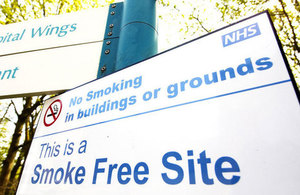Reducing high smoking rates among patients in mental health units
New guidance highlights case studies of successful implementation of NICE guidance and the benefits for patients and staff.

New figures from Public Health England (PHE) and NHS England shine fresh light on the high smoking rates among people living with mental health problems.
Nationally 33% of people with a mental health problem smoke compared to 18.7% in the population as a whole. A PHE and NHS England survey found that smoking rates among service users in mental health units is even higher at 64%. High smoking rates among people with mental health problems are the single largest contributor to their 10 to 20-year reduced life expectancy.
PHE and NHS England have today published new guidance to help medium and low secure mental health units best implement the NICE recommendation that all NHS funded sites should provide access to on-site stop smoking services and deliver care in an environment free of smoke.
The guidance highlights case studies which show the benefits of completely smokefree mental health units, where service users are provided support to stop smoking. This has resulted in:
- better patient health
- freeing up staff time
- improved ward atmosphere
Alongside the physical health improvements, an increasing body of research is finding that mental health can be improved by stopping smoking. Contrary to the myth, evidence shows that stopping smoking is associated with reduced depression, anxiety, stress and improved positive mood and quality of life.
Evidence also shows that people who smoke often require higher doses of psychotropic medication as smoking increases the metabolism of these drugs. Smoking is estimated to increase psychotropic drug costs in the UK by up to £40m per year. Medical guidelines indicate stopping smoking can lead to reductions in dosage and usage of psychotropic drugs which benefits the patient by reducing the side-effects associated with these medications.
The guidance coincides with new financial incentives from NHS England, which encourages mental health care providers to support users in secure settings to stop smoking.
Professor Kevin Fenton, National Director of Health and Wellbeing, PHE:
Public Health England’s vision is to reduce the unacceptable inequalities in health experienced by people living with mental health problems – starkly illustrated by our figures showing smoking rates in mental health units three times those in the population as a whole.
We cannot allow this, or the myth that smoking improves mental health, to continue. Our role is to speak to the evidence and this guidance highlights best practice for commissioners to reduce smoking in mental health units – as we move towards delivering care in an environment free of smoke - as we are in other NHS hospitals across the country.
Matthew Day, Consultant in Public Health Specialised Commissioning for PHE and the NHS England Mental Health Programme of Care Board:
We are learning from existing units that service users are just as likely to want to stop smoking as the general population, and can do so when offered support. Existing smokefree mental health units have made a real impact by providing a supportive environment to help users quit tobacco and experience the physical, mental, social and financial benefits of a smokefree life.
Mary Yates, Modern Matron at South London and Maudsley NHS Foundation Trust (SLaM):
Since going smokefree in October 2014, SLaM has demonstrated that when patients and staff are given appropriate support, the long standing culture of smoking in mental health services can be broken. All SLaM patients are now screened for smoking status at the first contact and offered appropriate help to make a quit attempt or abstain whilst in the smokefree hospital environment. Our staff have reinvested time previously spent facilitating smoking, to the provision of therapeutic activities which support health and wellbeing. The benefits to everyone have been significant.
Background
Public Health England exists to protect and improve the nation’s health and wellbeing, and reduce health inequalities. It does this through world-class science, knowledge and intelligence, advocacy, partnerships and the delivery of specialist public health services. PHE is an operationally autonomous executive agency of the Department of Health. www.gov.uk/phe Find us on Facebook: Follow us on Twitter: @PHE_uk